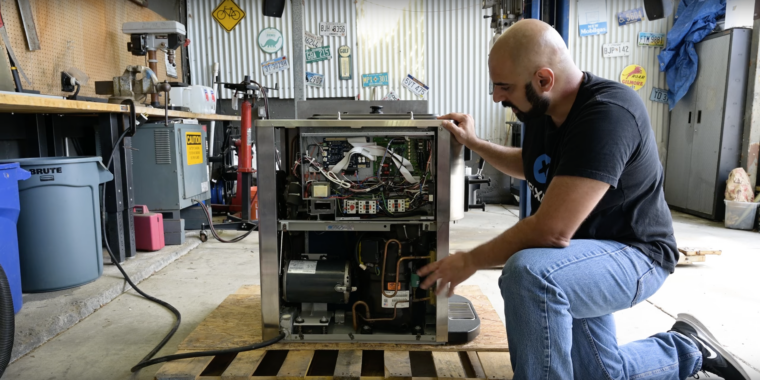McDonald’s soft-serve ice cream machines are regularly broken, and it’s not just your perception. When repair vendor and advocate iFixit was filming a video about the topic, it checked tracking map McBroken and found that 34 percent of the machines in the state of New York were reported inoperable. As I write this, the nationwide number of broken machines is just above 14 percent.
To improve the nation’s semi-frozen milk fat infrastructure, iFixit has done two things. One, as first reported by 404 Media, is to join with interest group Public Knowledge to petition the Copyright Office for an exemption allowing people to fix commercial equipment, such as McDonald’s ice cream machines and other industrial kitchen equipment, without fear of reprisal under Section 1201 of the DMCA.
There’s a comment at the end of the article explaining that the McDonald’s machines are somewhat unique in having a nightly pasteurization process that allows them to go two weeks between cleanings instead of requiring nightly cleaning like other machines.
Listeria is a risk if ice cream machines are not properly maintained. Recent case linked to ice cream machines: https://www.cnn.com/2023/08/20/us/tacoma-milkshake-listeria-deaths/index.html
Not that there are not clearly other issues at play. Just a couple important pieces of what’s going on that were not covered in the article itself.
And to be clear, they’re mostly down because the nightly boil of the ice cream mixture wasn’t completed due to overfilling the machine making it unable to reach the temp. The service company refuses to let the workers know that and the machine doesn’t volunteer that information.
So if there was a small window with a max fill line this problem would be solved?
In fact, Kytch made an aftermarket add-on to the machines to let the restaurants know what is wrong, without having to call Taylor for service.
McDonald’s corporate came out and said they weren’t allowed to do it, that it was dangerous to do it instead of calling Taylor, that it risked leaking McDonald’s proprietary business information.
In fact, Taylor makes ice cream machines for a number of fast food chains, but McDonald’s explicitly got the crappiest one (not as in “cheap”, but explicitly crappy, as McDonald’s corporate mandated their use).
Now why in the world does Taylor make good machines for other chains, and why in the world were operators not free to buy the better models or even fix the models they are allowed to buy? Taylor’s business results talk up the revenue for their paid repair service, and with the operators having easy access to know how to fix it/avoid the problem themselves, their repair volumes would go down. Evidently they have a particularly interesting business relationship and thus McDonald’s corporate was happy to through franchisees under the bus in service of that relationship.
Nowadays, it seems franchisees are allowed to get machines that actually self-report the problems. Presumably all the bad press around the whole ordeal moved it to the point of really needing to be fixed (also two vendors are allowed now instead of just Taylor)
I am guessing when they allowed Carpigiani machines in 2017, they probably opened up a bunch of other Taylor options.
There’s lots of ways that you could solve the problem. It’s not designed to be solved.
Or just a line stamped into the metal reservoir tub
You could even put an etch mark in the tank if you were the tech to fix the problem after the fact.
This ice cream machine saga is so bizarre…
It really isn’t once you understand the basics.
- Some company got a contract with McDonald’s to do all their ice cream machines, probably through a personal connection. This contract included expensive maintenance.
- The company made a shit product, probably to save costs. It both doesn’t work well and is a pain to service.
- McDonald’s has decided that the lost revenue is not as big of a deal as getting out of that shitty contract with a shitty company that made a shitty product.
That is all there is to it.
I’ve watched the fascinating YouTube documentary on it but it still seems crazy that the company is fighting so hard to stay shitty and terrible. They’ve attacked people trying to help too, like wtf?
That’s how you can make money. There’s a financial incentive to be a piece of shit many times, unfortunately.
Crapitalism: When you take capitalism and remove meaningful regulation.
You mean Neoliberalism, our current dark shade of Capitalism.
Whatever you call it, the end goal is always to make rich people richer while everyone else stagnates or loses.
It’s because McDonalds makes money by selling the machines to their franchisees.
I hope it ends less dramatically than the mc Donald too hot coffee saga.
I’m surprised nobody has gotten sick yet.
I’m sure plenty have tbh
It’s not much different than coke/Pepsi fountains….
Given how filthy those things get, I’m surprised people don’t get sick from them too.
Yah, everyone just needs to cool down.
It’s a request, not a demand
This is the best summary I could come up with:
When repair vendor and advocate iFixit was filming a video about the topic, it checked tracking map McBroken and found that 34 percent of the machines in the state of New York were reported inoperable.
One tiny company had previously attempted to address the glut of broken, indecipherable Taylor machines and was duly ostracized for its efforts.
Taylor, which reportedly has an exclusive contract with McDonald’s for maintenance of its machines, moved quickly to make the use of a Kytch a contract-voiding, franchise-ending issue.
The saga, as reported by Wired, has taken a few intriguing turns, including Taylor’s creation of a competing product, revealing discovery emails, and a $900 million Kytch lawsuit.
Public Knowledge and iFixit have submitted a petition to the Copyright Office to argue that bypassing the digital security measures on commercial equipment such as Taylor’s machines should not be illegal.
“The fact that this principle is not already embedded permanently into law demonstrates that our copyright system is as McBroken as the average McDonald’s ice cream machine.” (Link added by Public Knowledge.)
The original article contains 716 words, the summary contains 175 words. Saved 76%. I’m a bot and I’m open source!
This must be US-only, I’ve never seen an ice cream machine out of service at McD’s in Europe.
The service contract company is absolutely a US syndicate that’s harder to export. Only the British empire was able to effectively export it’s graft wholesale I think.
It’s so common here that it exists as it’s own website:
Not in the USA, but my password is my unique key that in cryptic my data, so therefore an FBI or any other agency is not allowed to pass it even if they could, no? As I’m the person who rode this password and therefore am the copyright holder of that password.
Not sure I understand your point.
What are you talking about?
Courts decide what a creative work is, not your personal attestation. Courts will not decide that your password is a creative work, in pretty much any context. You can’t copyright a password.
Using the hash of my artwork as my password for encryption lmfao
Only if the FBI is using rainbow tables of artworks to decrypt your hash I think. /s
As longe as you don’t do crimes …
Is the police allowed to enter your house when needed by law?
Besides this, you are probably replying the wrong post.
You might be thinking of the password vs fingerprint phone unlock. Courts decided that while your fingerprint could be compelled, you couldn’t be compelled to reveal your password as that was private knowledge. That isn’t due to copyright though, it’s a 5th Amendment issue here in the US (The Fifth Amendment grants anyone in the U.S. the right to remain silent, which includes the right to not turn over information that could incriminate them in a crime. These days, those protections extend to the passcodes that only a device owner knows).
We’ve written plenty of legal justification around it, but ultimately it just comes down to the fact that police CAN physically place your finger into your phone, but cannot extract a password from your brain that you don’t want to give up.
If we had the ability to read minds, there’d be legal justification to grab your password within a year.
deleted by creator
You can always put your phone into lockdown mode so that the password is required to unlock the phone, not just your fingerprint.
Face and fingerprint unlock is too convenient for me to not have it at all.
That requires me to do it potentially under duress, with little to no time, etc. During a crisis it can’t be assumed that the first thing I’ll do is lockdown my phone. Anything that requires an anticipatory step is inherently risky.
There are technologies the police are not allowed to use for constitutional reasons. If brain reading was a thing, the 5th amendment would still protect you. Not that they wouldn’t try before getting smacked down.











